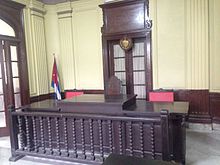Judicial system of Cuba
The period of United States occupation and influence resulted in developments such as the Supreme Court of Cuba.
Professional judges in Cuba are elected for unlimited terms, serving until they are no longer capable or until removed by the electoral body.
[citation needed] Under Cuban law, judges are required to be independent in their judgment and free from the influence of organs of government in their deliberations.
The legal profession saw its prestige decline as the new society looked toward it as another manifestation of the bourgeoisie that was to become unnecessary in the coming years of revolution.
In the mid-1960s, Blas Roca Caldero began a process whereby the legal system in Cuba was resurrected to provide for the institutionalization of the Revolution.
Today, the legal profession serves both individuals and enterprises, as well as provides counsel to the government as Cuba struggles to find its place in the international economy.
In order to practice in a buffeter, one must graduate from law school in Cuba or a foreign country with Cuban validation.
A small number of bufetes specializing in providing legal assistance to foreign nationals have arisen in recent years.
These lawyers receive a lower salary than their counterparts in the bufetes, but this is offset somewhat by added perks and bonuses from their employer.
Although historically relegated to ensuring contracts complied with government regulations, the shifts in the Cuban economy following the collapse of the Soviet Union have led to legal advisors taking a more active role in the market-based, commercial dealings of Cuba.
Headquartered in Havana, the UNJC comments on proposed legislation, publishes a law review (Revista Cubana de Derecho), and organizes various national and international legal conferences and symposia.
In the early 1990s, a new plan was instituted that emphasized basic theory and history in a number of different areas of the law, coupled with practical experience.
Between 1982 and 1992, graduating law students were required to work in a bufete for three years as a social service and to gain experience in a wide range of practice areas.
